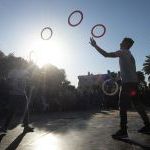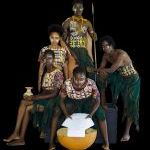Kreativ Global
The goal of Kreativ Global is to encourage young people to participate as 'Global Change Agents' in positively shaping a common, planet friendly future. The direct exchange between artistic groups from the Global South and the youth of the Global North helps to gain a new perspective on the urgent, worldwide problems we share. During three (or more) days of workshops, presentations and actions, the young people aquire knowledge on the Sustainable Development Goals (SDGs), such as climate change, and develop individual ways of expressing their thoughts and stories via artistic language.
Website
Useful links
https://kinderkulturkarawane.de/wp/
The British Council offers information about organising a school exchange in another country
Country
Media
* TOP TIP *
'Research opportunities for exchanging ideas and solutions on climate issues with schools in other countries.It is a great way to share knowledge and best practice as we're all in it together!'
How is the project linked to climate change and sustainability?
Each part of the world has common, but also individual challenges concerning climate change and sustainability. An exchange between young people helps in understanding these individual difficulties. The resulting change in perspective is necessary to develop and shape a sustainable way of living while considering each country's needs. Cultural peer-learning is an innovative way of learning and makes it easier for less privileged people (e.g. refugees, social barriers) to participate.
Who is involved?
Schools and youth centres can participate and invite a group of the Global South. While the young students take part in the workshops, families are organizied to host the artistic groups and are invited to visit the presentations and performances. Teachers work closely with the organising NGO, and a tour guide is supervising the artistic group and providing the contact point for the teachers.
How are the participants involved?
The students from the Global North can participate in the exchange with young activists from the Global South at their school. The exchange is led by the group's leader and also supervised by at least one pedagogue from the schools or youth center. The event often starts with a performance by the visitors. Here they express their stories and problems via using artistic elements from dance, music and theatre. In the following workshops the young people learn from each other and discuss solutions and concepts for problem solving in an artistic way. Often these exchanges result in a joint presentation, which pedagogues and families can attend. A tour guide is present to help and translate. In Kreativ Global, the organising NGO is in touch with the pedagogues to prepare and then later on evaluate the meetings. They're also organising the tour plan (schools, bus, flights, visas etc.) for the visitors from the Global South.
Key steps:
Cultural exchanges and ideas sharing are a great way to engage young people. You may take inspiration from Kreativ Global to develop your own exchange. Whilst a physical event is the best, you could plan a simpler online exchange with a school in another country. Here are some steps to consider:
Step 1. Identify a teacher at your school or youth centre who will lead the project and participate and supervise the exchange.
Step 2. Consider whether you wish to host a physical exchange visit, or perhaps look at an online version if time and resources don't permit
Step 3. Look for specialist NGOs (eg in this instance the KinderKulturKarawane) who may be able to help arrange the exchange and help with funding
Step 4. Prepare the exchange: For an online event, you'll need to prepare activities and ideas in advance; arrange a suitable time; ensure everyone has connectivity and language isn't a barrier. For a physical visit you may need to organise host families for the visitors, invite the school's community to open events, organise rooms and equipment if needed.
Step 5. Implement the exchange with workshops and performances.
Step 6. Evaluate with the students: Do they have plans to become activists themselves? Have they gained new knowledge on the world's common problems, has their perspective possibly changed and do they have ideas for solutions?


